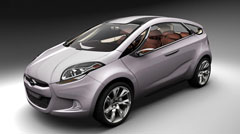Jun 3 2008
Bayer MaterialScience AG is ringing in a new era in automotive glazing with its „BayVision" competence brand. Under this umbrella brand, the company is pooling not only its glazing raw materials, but also its in-depth technological know-how in plastics processing and its comprehensive development and engineering resources. Services tailored to individual customer needs range from support in mold engineering and part design, all the way to advice on coating issues. One current example for putting the „BayVision” package into action is the i-mode concept car, developed in collaboration with Hyundai and unveiled at the 2008 Geneva Auto Show. It is equipped with a total of eleven glazing components made of the high-performance polycarbonate Makrolon®, which would be difficult or impossible to manufacture from glass. The i-mode is the world's first vehicle to bear the "BayVision" logo.
 The "i-mode" exhibits many outstanding features which are the result of close development partnership between Hyundai and Bayer MaterialScience AG. Thus the Makrolon® roof module underscores as a styling element the dynamism of the vehicle.
The "i-mode" exhibits many outstanding features which are the result of close development partnership between Hyundai and Bayer MaterialScience AG. Thus the Makrolon® roof module underscores as a styling element the dynamism of the vehicle.
It already is evident today that both automotive OEMs and suppliers will be attaching increasing importance to the weight and design of their vehicles and components in the future. By using Makrolon® polycarbonate instead of glass, dramatic reductions in weight and futuristic 3D styling can easily be achieved. "With BayVision, we are launching a brand that pools all our competence in the field of automotive glazing and makes it visible to the general public. Customers get a comprehensive package for automotive glazing from a single source," explains Volkhard Krause, global head of the Automotive Glazing team at Bayer MaterialScience. "Our goal is to turn our project partners’ visions into reality. For us, that means providing continuous support, from the original idea all the way to full-scale implementation."
Looking to the future
The trend in automotive engineering is unmistakable: specialists expect a significant increase in transparent surfaces over the next few years. For example, car roofs will be perceived as design objects; large panorama roofs and associated three-dimensional designs in the roof and tail regions are the future. "Glazing made of polycarbonate can be produced in an ultra-modern injection molding process, making it possible to directly integrate functions and parts without difficulty, such as antennas and fixing elements," explains Krause. The roof module of the Mercedes GL and the panorama roof of the smart fortwo are already in full-scale production – and both incorporate Makrolon® AG2677, Makroblend® 7665 and Bayblend T 95 MF from Bayer MaterialScience. "We collaborate with our customers to determine precise requirements for their end products, adapting both the polycarbonate and the coating process to these requirements, while identifying appropriate coating systems," the glazing specialist says.
Ideal basis for unique styling
Compared with glass, the main advantage of polycarbonate as a glazing material is that it offers designers greater freedom, as demonstrated most impressively by the i-mode concept car. Cutting weight by up to 50 percent compared with glass also leads to reductions in fuel consumption and hence CO2 emissions. At the same time, it lowers the vehicle's center of gravity and improves driving performance.
„BayVision”: A complete solution from a singe source
Material, processing, analysis, design support: Bayer MaterialScience offers an all-round service for automotive glazing that encompasses the entire process chain. What's more, the underlying technologies are constantly being improved. These superior glazing concepts are supported by Bayer MaterialScience's comprehensive expertise and its close and trust-based collaboration with customers. The „BayVision” brand is a complete package that primarily stands for one thing: competence in glazing.